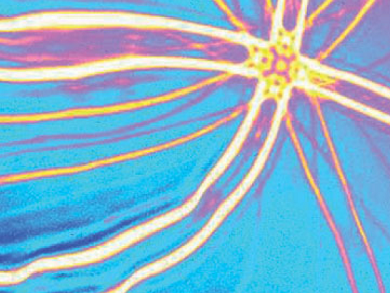There is great interest in ZnO nanoparticles because of their unique optical and electrical properties.
A novel nanocomposite comprising ZnO nanoparticles bound to the Autographa californica nuclear polyhedrosis virus (AcNPV) has been developed by Jinchun Chen, Peking University, Beijing, P.R. China and coworkers. They show that combining the baculoviral surface display technology with peptide-mediated immobilization of nanoparticles is suitable for biological applications.
A His-tagged ZnO GEPI (genetically engineered polypeptides for inorganics) gene was synthesized and fused to the N terminus of an AcNPV homologue. This generic approach may be useful in the biodetection field as, e.g., quantum dot-based biotracking or bioimaging. Nanoparticle-immobilized viruses may also be used as building blocks to construct functional nanoelectric devices in the future.
- Inorganic binding peptide-mediated immobilization based on baculovirus surface display system
L. Song, Y. Liu, J. Chen,
J. Basic Microbiol. 2010, 50, 457–464.
DOI: 10.1002/jobm.200900359




